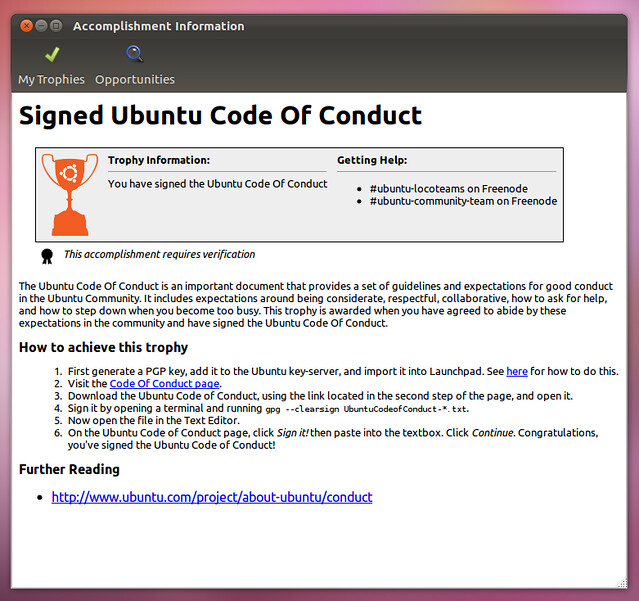Recently I have been blogging about the [Ubuntu Accomplishments](https://wiki.ubuntu.com/Accomplishments) system that I have been building. While the feedback has been very positive, I know a few people are a little uncertain about the concept of trophies in a collaborative community environment. While I believe that receiving acknowledgement of accomplishments is a good thing and motivating, it also depends on having the *right* kind of accomplishments available. I just wanted to share this philosophy a little more.
There is a reason why this is not called the *Ubuntu Achievements* system…
Many of you will have seen some of the rather pointless badges and trophies achievements that are available on various websites, forums, and elsewhere. A good example of this is the *number of posts* rankings that many forums have. The idea is that when you reach a certain number of posts (e.g. 50) you get a special rank. When you hit the next post count (e.g. 200) you get the next rank up. This keeps going and going and it helps to reflect the level of activity of the different members of a forum.
While useful for showing active participation, this is ineffective for showing or maintaining quality. Part of the problem is that typically the higher rankings (as in, the higher number of posts made) tend to be presented in the rank form as a greater breadth of knowledge or commitment to the forum (e.g you first get ‘Newbie’, and then ‘Expert’, and then ‘Master’).
This is a misnomer; a large number of posts does not necessarily mean “*lots of knowledge or experience*”, it can often mean “*lots of noisy, random, bollocks*”.
As every forum has seen, you can find people who post meaningless content just to get their post counts up to hit the next rank. In this case the premise of ranks serves an inspirational purpose (people *want* those ranks), but the way in which they get them defeats the purpose of the system. I suspect this is an example of the problem that some people see with trophy systems in collaborative communities.
The forums example demonstrates that the concept of highlighting committed and thoughtful people on the forum is a valuable idea (people do find the distinction of quality or experience rewarding), but the approach of representing and determining quality by the number of posts made is both ineffective and can be gamed easily.
## Focusing on Experiences, not Traffic
The reason why *Ubuntu Accomplishments* is called *Ubuntu **Accomplishments*** is because (at least in my mind) an *accomplishment* is very different to an *achievement*. The philosophy behind the system is about accomplishing things of merit and value, not about achieving things via the amount of content or traffic produced.
I tend to think of the kind of accomplishments I want to see available as *new experiences*. Posting 50 comments to a bug report, or 500 posts to a forum is not a new experience; it is a representation of traffic generated (in the same way that driving 500 miles doesn’t make you a good driver, just a patient one with a sore arse).
Filing your very first bug in Ubuntu *is* a new experience. No matter how small it may seem, learning the skills and understanding how to navigate a bug tracker to file a good bug and provide useful information is worthy of recognition and merit; the user has accomplished learning a new skill. The same can be applied to becoming an Ubuntu Member, translating your first string, organizing your first [Ubuntu Global Jam](https://loco.ubuntu.com/events/globaljam) event, and hundreds of other things. It is these kinds of new experiences that I want to form the backbone of the accomplishments available in *Ubuntu Accomplishments*.
When we present these new experiences as potential accomplishments and present the knowledge, guidance, and recommendations to help our new community members be successful, we start to really lower the bar in how people explore and learn the nuances of how different parts of our community work. At the core of *Ubuntu Accomplishments* we not only want to reflect the accomplishment of new experiences and contributions, but to also provide an incredibly discoverable means of learning, exploring, and feeling good about your contributions.

An example of the information you see when clicking on an Opportunity.
To be completely clear: Ubuntu Accomplishments is very much of a learning experience, and I am looking forward to plenty of discussion around what makes great accomplishments. I am by no means an expert on any of this…far from it. My goal here was to build a system that works and that provides a mechanism in which we can explore different types of accomplishment that are rewarding to receive and bring value to the community.








